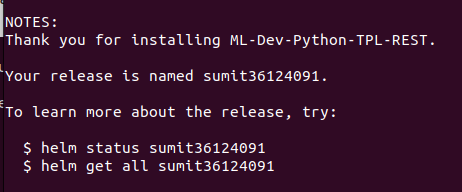In this step, we will install the Python helm chart on the remote icekube Kubernetes cluster using Linux bash shell So, be ready for the next adventure interacting with the command line terminal.
Table of Contents
Step: Launch Bash shell and switch to the required directory.
Switch to the .helm directory for the given repository: Path for the folder is
PYTHON_SETUP_KUBERNETES->repository->.helm

Step: Install Helm chart
We have to name the hell chart before installing, use the combination of your first name and 8 digit unique number to name your helm chart. We are doing this because there are so many helm charts installed on the cluster by different users, if we accidentally use the same name, it will not install the helm chart. Also, it will help us to generate a unique personal weblink for our matlab.
Generate an eight-digit unique number.
Generate a 8 digit unique number from this link or any other source on web which you feel comfortable. For example, you generate an 8-digit unique number “36718160” use it with your first name as a combination. For example, first name is johnny and the unique number “36718160”, then the name of the helm chart you have to use johnny36718160
Note
Write down your unique name. Do not forget it, in case first name on the cluster matches with someone, you will get confused.
Check Kubernetes context
We have to use icekube context otherwise we will install helm chart accidentally on local environment.
Command to switch from existing context to icekube context with ltu-default namespace
$ kubectl config set-context icekube --namespace=ltu-default
OR
$ kubectl config use-context icekube
$ kubectl config set-context --current --namespace=ltu-default

Command to list the current context used.
$ kubectl config current-context

Install Helm Chart
Once you are sure that you have switched to icekube context you can proceed installing helm chart. You need to open the bash shell and switch to the .helm directory of the extracted project folder.
The complete path of the .helm folder is PYTHON_SETUP_KUBERNETES->repository->.helm

We have already configured the various files required. Now, use the unique combination of the first name along with 8 random digits you generated.
For example: In this case, it is sumit36124091
Use the below command along with the unique name and giving file path to values_icekube.yaml which is located under the current directory.
$ helm install --debug sumit36124091 ./ -f ./values_icekube.yaml

You will get a message in the end that Python is installed.

Step: Check the status of the pod
To view whether your helm chart is installed and deployed or not just simply use the below command.
List all helm charts Installed
$ helm list

To view all the resources
$ kubectl get all
